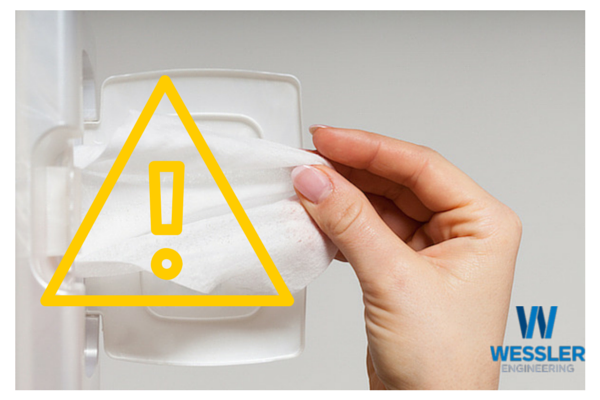It's doing millions of dollars worth of damage each year and the problem does not seem to be going away anytime soon.
What is it? The so-called "flushable wipe."

The wet wipe industry is booming. Unfortunately, some of these products are branded as “flushable.” Wastewater officials and those bringing lawsuits against wipes manufacturers are contesting this label, but change in consumer habits and industry marketing is not happening quickly enough.
The Problem with Flushable Wipes
When these wipes (which do not actually disintegrate the way toilet paper does) gather in sewer lines and treatment plants, they combine with other materials, like congealed grease, to create a "superknot." These knots in a community's sewer system can damage infrastructure and cause municipal employees to spend hours manually pulling knots out of the system.
The New York Times recently featured an article on this growing problem:
"The city has spent more than $18 million in the past five years on wipe-related equipment problems, officials said. The volume of materials extracted from screening machines at the city’s wastewater treatment plants has more than doubled since 2008, an increase attributed largely to the wipes.
The city is not alone. Wet wipes, which do not disintegrate the way traditional toilet paper does, have plagued Hawaii and Alaska, Wisconsinand California. Sewer systems have been stuffed in Portland, Ore., and Portland, Me. Semantic debates have visited Charleston, W.Va., challenging the latitude of “flushability.” “I agree that they’re flushable,” said Tim Haapala, operations manager for the Charleston Sanitary Board. “A golf ball is flushable, but it’s not a good idea.”
What can communities do to help educate the public about this problem?
1. Homeowner's sewer line costs.
Property owners need to understand the damage these products can cause in their own sewer lines. Flushable wipes can cause backups in the home's sewer line, which homeowners and property owners are responsible for maintaining and repairing. The potential cost of repair and cleanup can run into the thousands of dollars in plumbing bills.
2. Sewage bills go up for everyone.
Many community's are being forced to make expensive repairs and improvements to their facilities, and these costs get passed on to taxpayers.
In 2012, the city of Vancouver spent more than $700,000 installing new non-clogging pumps around the city. The pumps allow the wipes to go through, but then they are caught later on by a screen where they are manually removed.
Vancouver still spends $100,000 each year pulling knots out of pumping stations. All of these costs mean higher sewage and water bills for everyone in the city.
3. Educate about proper disposal.
There's nothing wrong with using wet wipes, as long as they are disposed of in the trash and not down the drain. Include educational information on your website, like this video.
How is your community educating the public about the problem of flushable wipes? Share in the comments below.
Tags

